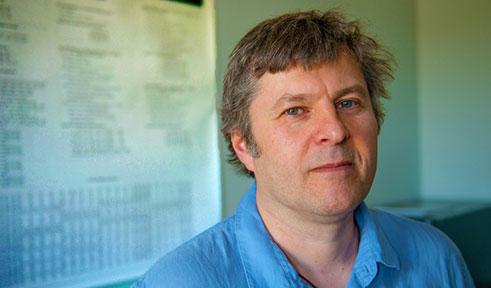
Mathematics
Our students have gone on to pursue careers in academia, business, law, and medicine. Most of our graduates move on to graduate school after receiving their degree, many of them in fields other than mathematics, fields in which the mathematical expertise imparted by our program can be put to good use.
Eligibility
Students applying to the program should have exceptional ability and interest in mathematics. Applicants are selected on the basis of superior academic ability and the potential for self-motivated undergraduate study and research.
Program Overview
All entering tutorial students will be enrolled in a seminar for the first two semesters of their freshman year. The purpose of this seminar is to introduce students to mathematics as it really is, viz., abstract quantitative thinking. Also, students who have not completed their calculus before entering Ohio University will finish it via a regular calculus course.
At the end of the second semester, students from the seminar will be given a preliminary examination to evaluate their ability to continue in the program. Thereafter the student's primary work in mathematics will take place in tutorials. These consist of regularly scheduled instructional sessions on a one-to-one basis with a faculty tutor who directs the student's study in a specified topic area.
There are three required areas of study in mathematics.
- Analysis: the topology of Euclidean n-space, limits and continuity in Euclidean n-space, convergence of functions, differentiation of functions of one or more variables, and Riemann-Stieltjes integration.
- Abstract algebra group theory, rings and modules, field theory and linear algebra.
- For the third area of study there is a choice, either topology or applied mathematics. i) For topology this would involve the structure of a topology, separation axioms, connectedness, compactness notions, continuity, product and quotient spaces, metric spaces, and set theory and logic. ii) The student selecting applied mathematics as their third study area will meet with the director of studies and the assigned tutor to create a suitable and approved study plan for the topics of their choice. These could include differential equations, optimization, statistics, complex variables, numerical analysis, harmonic analysis and wavelets, spectral analysis in Hilbert space, etc.
These three areas are normally taken in the order listed above and usually extend over several semesters each.
Each student must also finish the English writing and composition requirements of the university as well as write an undergraduate honors thesis in mathematics in accordance with the general requirements of the Honors Tutorial College. Students must also complete the HTC freshman seminar.
In addition to the above requirements, most students are encouraged to include some other electives both in mathematics and other disciplines to round out their education. The amount and nature of this material is planned by each student individually and is in no way specified, though it should not unduly interfere with satisfactory progress in the mathematics program.
The student has successfully completed the Mathematics Tutorial Program at Ohio University when they have:
- completed the three required areas of study in mathematics as listed above and passed a comprehensive examination in each
- completed the HTC freshman seminar
- completed the English requirement of the university
- submitted and defended an undergraduate mathematics thesis that is approved by the Honors Tutorial College
There are no specified number of credit hours required for graduation.
Director of Studies

Dr. Alexei Davydov
Director of Tutorial Studies
Department of Mathematics
Ohio University
519 Morton Hall
(740) 593-1265
davydov@ohio.edu
Education
Ph.D., Moscow State University
Research Interests
- Algebra: representation theory, Hopf algebras, quantum groups;
- Category theory: monoidal categories;
- Mathematical Physics: conformal field theories